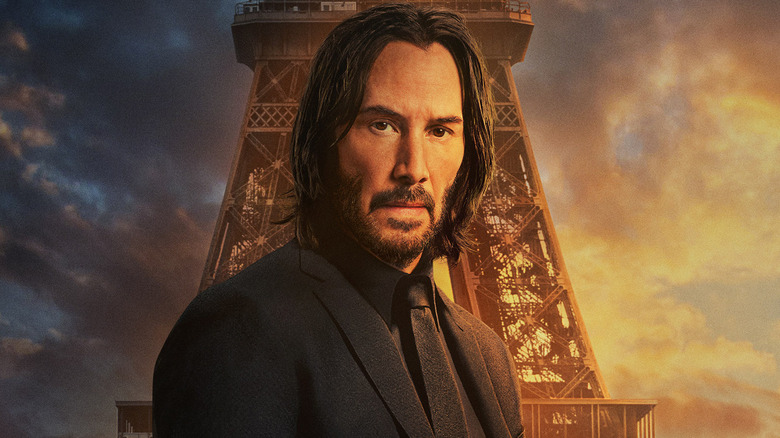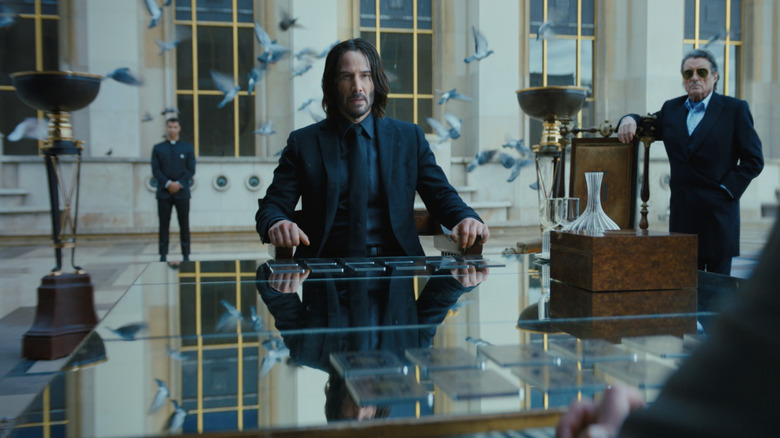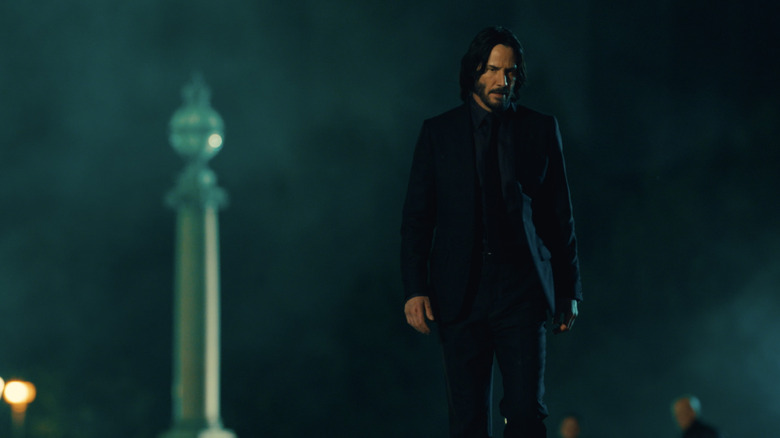Let's Solve The Biggest Mystery In John Wick: Chapter 4
Warning: This article discusses major spoilers for "John Wick: Chapter 4." Proceed at your own risk!
John Wick: the man, the myth, the legend. With each and every installment of this franchise, our hero has steadily reinvented himself until he became widely feared as the unstoppable killing machine that haunts the nightmares of the esteemed High Table itself. "John Wick: Chapter 4" always had the makings of a genuine epic, even aside from its giant-sized runtime. The sequel is packed with Biblical quotes, revolutionary imagery from famous paintings, and even overt allusions to Greek mythology. But more than any of that, the climactic battle that closes out the film — pitting Keanu Reeves' John Wick against Donnie Yen's Caine (himself a proxy fighter subbing in for the hateful Marquis Vincent de Gramont, played by Bill Skarsgård) in a duel to the death — makes a martyr out of the Baba Yaga and sends him off into the great hereafter.
... or does it?
The conclusion might seem pretty definitive, as the camera holds on John's tombstone in New York City alongside that of his late wife Helen, which he earlier requested to bear the words to sum up his entire life: "Loving husband." While Laurence Fishburne's Bowery King and Ian McShane's Continental manager Winston look on mournfully, they ponder whether he resides in heaven or hell. But, without a word, it's clear that the haunted specter of John Wick has, at last, found his long-sought-after peace. But is he truly dead, especially without evidence of an actual body in that grave?
That purposefully ambiguous mystery at the end of "John Wick: Chapter 4" might require a little bit of investigation.
Proof of life
It's the age-old maxim of countless genre films: If you don't see a body, that character (probably) ain't dead. In "Chapter 4," the climactic duel to the death ends with the "arrogant a**hole" Marquis outwitted one final time as a mortally wounded Wick plants a bullet squarely between the eyes of his foe. Granted absolution from the High Table and all of its obligations as part of the terms of this deal, he walks away a free man and asks Winston to take him "home" ... before he stumbles to the ground, sees one final vision of his beloved wife Helen, and ... that's it. That's our final glimpse of John Wick.
But, again, is this genuine proof that he's really dead and gone?
Obviously, the only answer that matters is that director Chad Stahelski chose to approach Wick's fate in such a way for a good reason. The question of future sequels remains somewhat up in the air, but that's hardly a primary concern when watching the story in the here and now. In the confines of the film's text, John is confronted time and again with the futility of his one-man mission to kill, well, basically everyone. "Where does this end?" he's asked by close confidant Winston at a crucial juncture. The most fitting answer, as it turns out, could very well be that it ends with his own death ... or, at least, that of his assassin identity.
Is it possible that John Wick, the Baba Yaga, had to die so that John Wick, the man who once escaped this life to settle down as a civilian, could live once more? That's certainly a valid interpretation. But whether he's six feet under or happily retired, it seems certain that John's gunslinger days are over.
Be seein' you?
What's the most fitting send-off for a killer who's proven to be all but unkillable through the better part of four entire movies? John Wick lost his wife, his puppy, his car, his good standing with the Continental, untold amounts of blood, and even his finger. What more does a man like that have left to give? Well, his life, of course. That's largely why I'm predisposed to taking the waning moments of "Chapter 4" at face value. Having essentially lost his life the moment he experienced the back-to-back tragedies of losing Helen and Daisy, the puppy she gifted him posthumously, he's essentially been racing against the clock to postpone the inevitable. It was only a matter of time before physical death finally caught up with his emotional death. There are far less poignant ways to go out, after all.
Though he's survived much worse throughout the films, looking at the "Wick"-verse through the lens of realism runs counter to the entire point of the series. No reasonable person would go on such a rampage just to avenge a puppy and a car, right? Well, that little leap in logic doesn't matter when such pain tracks as emotionally as it does. Similarly, Wick might've "only" endured three gunshot wounds by the reluctant Caine (on top of, well, all the punishment he took beforehand). But now that he finally accomplished his mission and no longer needed to stay alive another day to kill another enemy, well, there's something poetic about the idea of Wick willingly choosing to slip away and reunite with his dearly departed Helen (and Daisy!) on his own terms.
Will this ending satisfy all Wick fans? Probably not. But one thing's for sure: The Baba Yaga deserved to finally find some peace, however he could.


